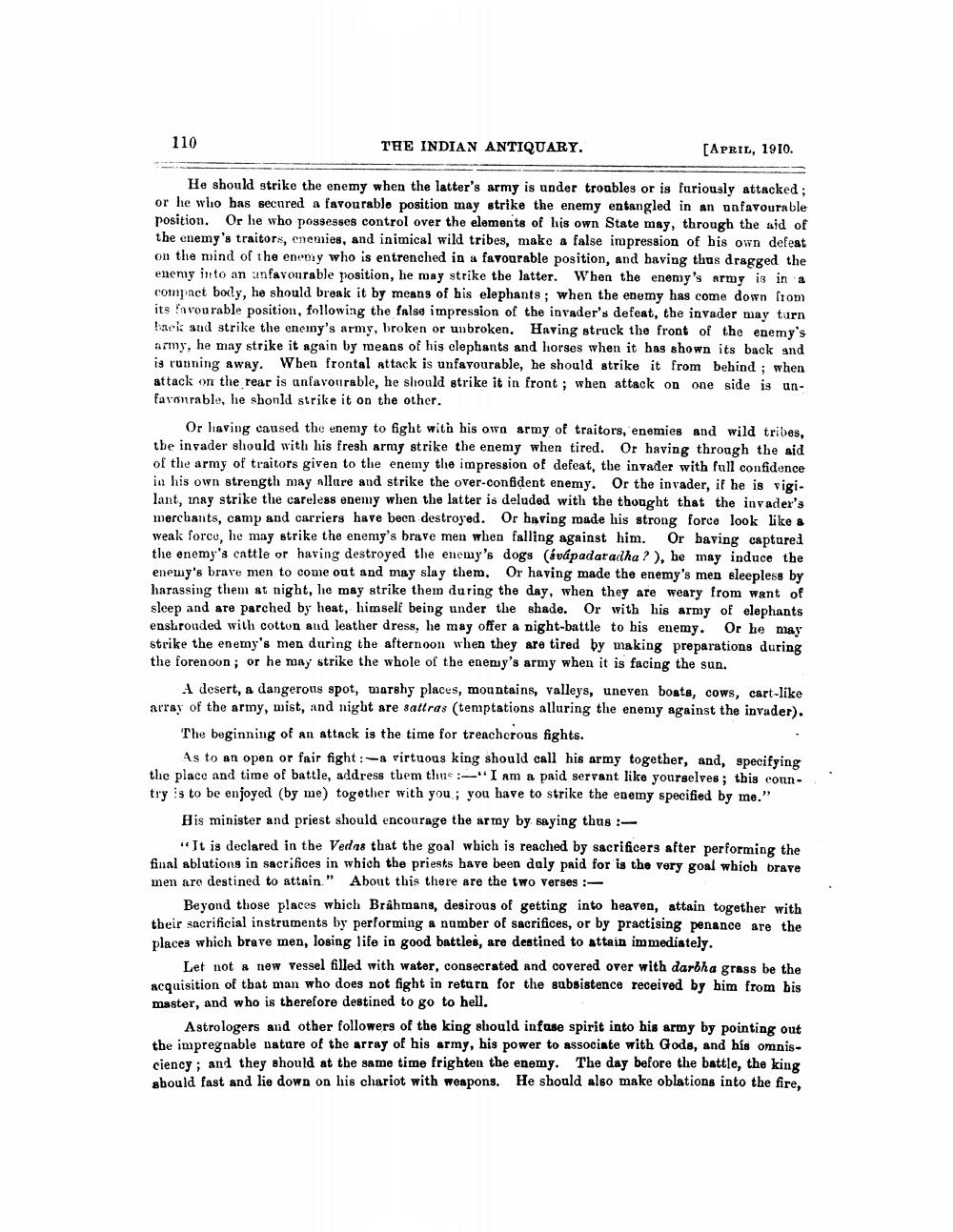________________
110
THE INDIAN ANTIQUARY.
[APRIL, 1910.
He should strike the enemy when the latter's army is under troubles or is furiously attacked; or he who has secured a favourable position may strike the enemy entangled in an unfavourable position. Or he who possesses control over the elements of his own State may, through the aid of the enemy's traitors, enemies, and inimical wild tribes, make a false impression of his own defeat on the mind of the enemy who is entrenched in a favourable position, and having thus dragged the enemy into an unfavourable position, he may strike the latter. When the enemy's army is in a compact body, he should break it by means of his elephants; when the enemy has come down from its favourable position, following the false impression of the invader's defeat, the invader may turn back and strike the enemy's army, broken or unbroken. Having struck the front of the enemy's army, he may strike it again by means of his elephants and horses when it has shown its back and is running away. When frontal attack is unfavourable, he should strike it from behind; when attack on the rear is unfavourable, he should strike it in front; when attack on one side is unfavourable, he should strike it on the other.
Or having caused the enemy to fight with his own army of traitors, enemies and wild tribes, the invader should with his fresh army strike the enemy when tired. Or having through the aid of the army of traitors given to the enemy the impression of defeat, the invader with full confidence in his own strength may allure and strike the over-confident enemy. Or the invader, if he is vigilant, may strike the careless enemy when the latter is deluded with the thought that the invader's merchants, camp and carriers have been destroyed. Or having made his strong force look like a weak force, he may strike the enemy's brave men when falling against him. Or having captured the enemy's cattle or having destroyed the enemy's dogs (ávápadaradha?), he may induce the enemy's brave men to come out and may slay them. Or having made the enemy's men sleepless by harassing them at night, he may strike them during the day, when they are weary from want of sleep and are parched by heat, himself being under the shade. Or with his army of elephants enshrouded with cotton and leather dress, he may offer a night-battle to his enemy. Or he may strike the enemy's men during the afternoon when they are tired by making preparations during the forenoon; or he may strike the whole of the enemy's army when it is facing the sun.
A desert, a dangerous spot, marshy places, mountains, valleys, uneven boats, cows, cart-like array of the army, mist, and night are sattras (temptations alluring the enemy against the invader).
The beginning of an attack is the time for treacherous fights.
As to an open or fair fight:-a virtuous king should call his army together, and, specifying the place and time of battle, address them thus I am a paid servant like yourselves; this country is to be enjoyed (by me) together with you; you have to strike the enemy specified by me."
His minister and priest should encourage the army by saying thus:
"It is declared in the Vedas that the goal which is reached by sacrificers after performing the final ablutions in sacrifices in which the priests have been duly paid for is the very goal which brave men are destined to attain." About this there are the two verses :
Beyond those places which Brahmans, desirous of getting into heaven, attain together with their sacrificial instruments by performing a number of sacrifices, or by practising penance are the places which brave men, losing life in good battles, are destined to attain immediately.
Let not a new vessel filled with water, consecrated and covered over with darbha grass be the acquisition of that man who does not fight in return for the subsistence received by him from his master, and who is therefore destined to go to hell.
Astrologers and other followers of the king should infase spirit into his army by pointing out the impregnable nature of the array of his army, his power to associate with Gods, and his omnisciency; and they should at the same time frighten the enemy. The day before the battle, the king should fast and lie down on his chariot with weapons. He should also make oblations into the fire,




